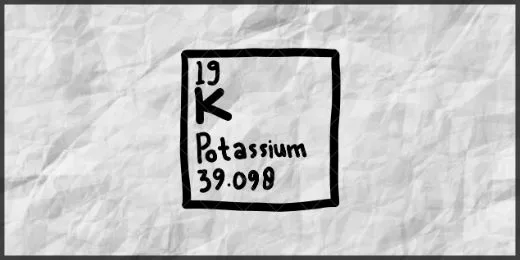The Importance of Potassium
A proper amount of potassium in your system is critical for good health. This vital mineral is in charge of muscular contraction, nerve transmission, heart function, and fluid and electrolyte balance in the body.
Potassium not only helps to regulate blood pressure, but it also prevents bone loss and promotes healthy muscle function. Make sure you get enough of this vital nutrient every day!
Potassium-rich foods can help prevent or manage conditions such as high blood pressure, stroke, heart disease, and kidney disease. Potassium is abundant in bananas, oranges, tomatoes, potatoes, and beans.
The recommended daily potassium consumption is 4,700 mg, and most people should be able to meet this requirement through diet. Some people may need a potassium supplement to get the necessary amount.
Sources of Potassium
Potassium is at the top of the list of nutrients that your body indeed requires. It shows the importance of potassium in the human body. It helps with muscle movement, neuron function, and heart health. Potassium is essential for maintaining your body’s fluid and electrolyte balance!
Two primary ways to incorporate potassium into your diet are food and supplements.
- Food:
Food is the greatest option. Potassium is abundant in fruits, vegetables, legumes, and dairy products. The better selections include potatoes, sweet potatoes, carrots, tomatoes, spinach, squash, kale, beans, lentils, and peas. Dairy products such as yoghurt, milk, and cheese can also be high in potassium.
- Supplements:
A supplement may be beneficial if you believe your diet isn’t supplying you with enough potassium. Potassium supplements come in two varieties: pills and powder. The most common and least expensive are pills, while powders are more costly but more quickly absorbed by the body. Before starting any supplement, it is advisable to talk to your doctor.
The Recommended Daily Allowance of Potassium
Experts recommend that individuals take 4,700 milligrammes of potassium per day. This mineral is significant for the proper functioning of the heart, muscles, and nerves, as well as for maintaining fluid balance and controlling blood pressure. This implies the importance of potassium in the human body.
Potassium can be found in a range of foods, including fruits and vegetables, meat, chicken, fish, and dairy products. Bananas, oranges, potatoes, and tomatoes are high in potassium. Adequate potassium consumption is critical for overall health since it can help prevent or reduce the likelihood of heart disease, high blood pressure, and stroke.
Are you aware that the daily potassium limit for adults is 4,700 mg? Unfortunately, the typical daily potassium consumption is only about 2,400 mg.
Try simple things like adding a banana to your breakfast cereal, eating a baked potato for lunch, nibbling on an orange or a handful of raisins, and eating a salad for supper to increase your potassium levels. Making these minor dietary changes can significantly enhance your health!
The Benefits of Potassium
Several foods contain potassium, a vital mineral for our health. It helps keep our blood pressure and fluid balance steady and plays a role in muscle contraction and nerve function. To ensure we’re getting enough potassium, taking a supplement may provide multiple potential benefits.
Taking potassium supplements may help you maintain normal potassium levels, preventing problems including high blood pressure, cardiac arrhythmias, muscle weakness, and cramps. You can also lower your risk of stroke and osteoporosis. It may also assist in alleviating your PMS symptoms. These points reveal the importance of potassium in the human body.
Potassium supplements are generally well accepted but can cause nausea, vomiting, diarrhoea, abdominal cramping, or headaches. To achieve the best benefits, use the supplement with meals to help reduce any unwanted effects. Before taking potassium supplements, anyone with kidney illness, heart disease, or high blood pressure should consult their doctor.
The Risks of Potassium
It’s important to be mindful of a few things regarding potassium. Here are the top five:
- Hypertension: Overeating potassium can strain your blood vessels, leading to high blood pressure and other health problems.
- Kidney damage: Excessive consumption might put an undue strain on your kidneys, potentially harming them.
- Muscle weakness: Both excessive and insufficient potassium can weaken your muscles.
- Digestive problems: A potassium imbalance can cause digestive issues such as constipation or diarrhoea.
- Heart arrhythmias: A potassium imbalance can increase your risk of abnormal heartbeats.
Conclusion
To summarise the importance of potassium in the human body, it is a vital element that aids in the efficient functioning of our body organs. We can suffer from health problems if we don’t get enough potassium.
To maintain maximum health, we must acquire enough of this mineral in our diet. Those who do not obtain enough potassium in their meals may need a potassium supplement. Finally, it is critical to grasp potassium’s value and role in our health and well-being.



